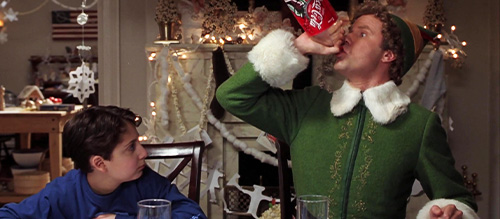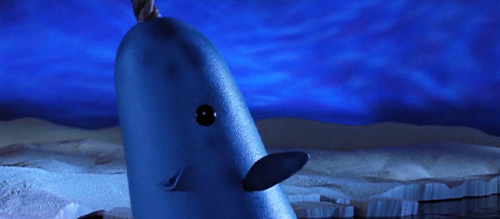Elf (2003) Review

Elf (2003)
Director: Jon Favreau
Screenwriter: David Berenbaum
Starring: Will Ferrell, James Caan, Bob Newhart, Zooey Deschanel, Ed Asner, Mary Steenburgen
Heart-warming, joyful and kind, Elf has become a timeless Christmas classic. The premise of a fully grown man dressed as an elf wandering around New York City in search of his birth father is one that could have made for a grotesque film, and yet thanks to the shared vision and unbridled devotion of its creators, this 2003 film remains as identifiable and rewatchable as ever.
Written by David Berenbaum and directed by Jon Favreau, Elf earned $223.3million from a $33million budget, making it a certifiable box office hit. It is now considered one of the best Christmas films ever made. There are several reasons for this.
First and foremost, its star…
Buddy was Will Ferrell’s breakout role and remains one of his most iconic performances. This was a star-making turn and led to Ferrell going from being an SNL cast member to one of the most beloved comedy actors in Hollywood. Vitally, to both Ferrell and 21st century comedy, Buddy has proven to be an outstanding and lasting protagonist.
Without any context regarding his comedy background, Will Ferrell could easily look like any businessman. He looks average in the best way possible, and at first glance is the last person who would seem suited to playing an elf. And this makes sense: the whole point of the film, and his character’s reason for travelling to NYC, is that he doesn’t fit in with other elves and wants to find his biological family. Even when he loses the costume, Buddy the elf never disappears – he shines brightly against deeply cynical backgrounds such as grimy cafes and depressing offices. Ferrell never falters, he is equally as entertaining in a suit as he is in an elf costume.
Elf is, at its heart, about rediscovering your inner child to find happiness, and this starts with Will Ferrell treating New York like his own personal playground. From interacting with clueless people in the street (yes, the guy in the white beard and red track suit Buddy refers to as Santa was not an actor), to playing with a revolving door until he throws up, Buddy’s energy is immediately contagious.
While Will Ferrell’s star power makes the film, Jon Favreau’s visionary direction is responsible for the film’s timeless quality. Favreau had the hindsight to avoid relying on computer effects, instead employing the use of forced perspective to make Buddy appear bigger than the rest of the elves for each scene set in the North Pole. While CGI continuously improves and gets more realistic, to the point that films that are only five years old already look dated, forced perspective will always remain effective – practical effects that tricked the eye almost twenty years ago cannot age. The strength of this vision and effectiveness of this technique is even more impressive considering that this is Favreau’s sophomore film as a director (following Made). To this day, Jon Favreau’s talents as a filmmaker continue to shape the history of blockbuster cinema, with 2008’s Iron Man launching the MCU, a multi-billion-dollar franchise, and his recent work on Disney live-action remakes altering big studio release slates forever.

From costumes to set design, Elf is instantly recognisable. Favreau and Berenbaum both cite Rankin/Bass’ animated specials as a leading influence: while the writer was inspired by the animation’s innocence in his childhood, the director decided that this would also influence the look of the film. The most obvious influence comes in Elf’s stop motion animation scenes, each of which serve a vital purpose regarding Buddy’s characterisation, setting the tone for him being a memorable, charming and unusual protagonist. Leading strongly with this influence also smartly taps into the nostalgia of older audience members. Films are, after all, a communal art. Whenever a film can play on the nostalgia of a generation while being creative, it yields great results.
The heart of this film lies beyond the quality of its lead performance and the creativity of those behind the scenes however, instead settling squarely on the father and son journey – one inspired by Berenbaum’s own grief. In Elf as in life, the idea of a parent rejecting a child is a powerful one, especially when facing a character as innocent as Buddy. Yet Buddy is not jaded by the rejection of his father; he embraces him and continues to love him unconditionally throughout the film. While this, of course, leads to some hilarious scenes, it also causes heart-breaking confrontations. Much of the effectiveness of this narrative strand comes from actor James Caan, best known for his role as Sonny Corleone in The Godfather, who plays to his strengths by offering a jaded and importantly intimidating presence. He is both a stand-in for the more cynical members of the audience and a noteworthy oppositional force for Buddy to bounce off. As a result of this passion, talented writing and overall quality of performance, Buddy’s father’s final acceptance of his son remains stirring to this day.
The supporting roles were also impeccably cast. Zooey Deschanel is able to strike a chord as a disenchanted worker who slowly rediscovers the magic of Christmas, while Bob Newhart brings his trademark dry humour to the character Papa Elf, balancing Buddy’s instincts as his level-headed father figure. Perhaps most crucially Ed Asner, who played Santa Claus a total of eight times in his career, is a wonderfully comforting presence in the film, radiating the same warmth we all expect of a globe-trotting gift giver.
Thanks to the shared vision of its creators and a star-making lead performance, Elf is a modern classic. Against many a stumbling block in the creative process, this strange premise for a Christmas story has ultimately made for one of the most perfect examples of a timeless Christmas favourite.
24/24
Written by Elisabetta Pulcini
You can support the author of this article, Elisabetta Pulcini, by following them and visiting their website:
Twitter – @ElisabettaPul
Website – elisabettapulcini

